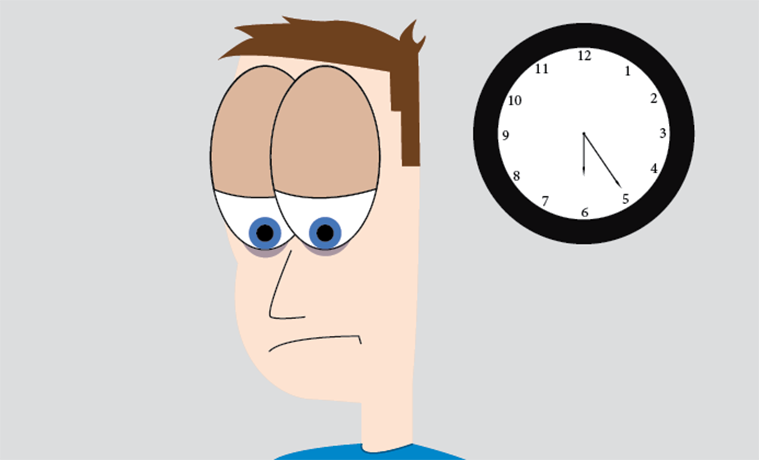I wake up every weekday morning at 6 a.m. I take a shower, eat breakfast and prepare myself for the day ahead. Usually, I am ready to leave my house by 7:20 a.m. I’m not involved in any after school activities right now so I get home after school around 3:10 p.m. However, this still leaves very little time for me to complete my loads of homework, eat dinner, get the recommended 60 minutes of exercise a day, socialize with my family and still get to bed at a reasonable time. Most nights, I’m not even ready to get into bed until 9:30-10 p.m. This is only about eight hours of sleep. I can tell you, on the average school day, I’m a very sleepy girl.
Unfortunately, I have it pretty easy compared to a lot of students. Some students like Hailey Russell ’19, have to wake up at 5 a.m. everyday for before school activities and don’t make it home until 6 p.m. due to after school activities. She can’t get to bed until at least 10 p.m., but usually falls asleep later. This makes for a mere seven hours or less of sleep. That’s high school.
Fortunately, there’s a very simple way to expel some of that unnecessary stress and tiredness. Pushing the school start time back at least one hour.
According to the Centers for Disease Control and Prevention (CDC), there are more than 40 states across the U.S. with 75% of their schools starting before 8:30 a.m. The CDC agrees that students attending those schools are not given enough time to get adequate sleep, and are therefore having to deal with the consequences. Schools that start do at or after 8:30 a.m. allow students to get their recommended 8.5-9.5 hours of sleep each night. Johnston starts almost an hour before that, at a scary 7:45 a.m. This leaves most students with an insufficient amount of sleep, which can cause depression, obesity, poor academic performance and even a higher risk for motor vehicle accidents.
In a recent study done by the University of Minnesota, more than 9,000 students from eight different high schools in Minnesota, Colorado and Wyoming performed better on tests and achieved higher grades in core classes when the school start time was made later than 8:30 a.m. in the day. They also noticed a significant decrease in tardiness, substance abuse and symptoms of depression, all things that some students at Johnston could certainly benefit from.
Doctor Amy Wallin, M.D., a pediatrician at Walnut Creek Pediatrics in West Des Moines also agrees with the CDC. “Sleep is essential for an adolescent’s body to function properly,” Wallin said. “Without it, there are numerous amounts of problems.” Wallin also explained how teenagers have a different internal clocking system than younger kids and adults. “Kids at the high school level usually aren’t ready to fall into deep sleep before 11 p.m. and therefore need to sleep until at least 7-8 a.m. to meet the 8-9 hours they need.”
Superintendent Corey Lunn believes that a later start time might be healthier for students. “The research is pretty clear that having a later start time for adolescents can be helpful both from an academic and well being perspective,” he said. “I am very supportive of this topic and any changes that may result in the betterment of our students.” He also described a plan called the district’s Foundation for Excellence (FFE) that is being implemented in our district, where they will be discussing the possibility of a later start time.
Another issue some may argue against changing the school start time is the time after school activities will begin. If the school start time is pushed at least an hour back, then the school end time will also have to be pushed at least an hour back. That would cause all sports team practices, club meetings, teacher conferences, and whatever else students have going on after to school to end even later in the evening. This will conflict with the already small window of time students have to do homework and other healthy, normal, human things after school. “Pushing school back one hour will cause kids in after school activities to get home even later than before,” Mesa Hassel ’19 said. “It’s just unrealistic.”
Yet again, there are still solutions to this problem. If students are truly dedicated and passionate about what they do, they can sacrifice their own sleep and try work with coaches and directors to start switching to morning practices, meetings or weight lifting sessions. Students can make the choice of sleeping in versus participation, and leave the rest of us not interested in sports or who don’t have time for clubs to enjoy our much deserved extra hour of sleep.







